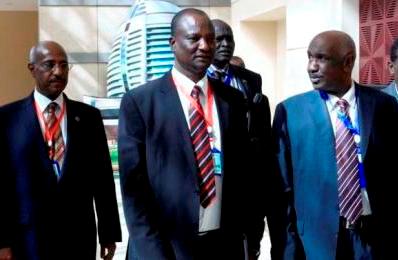South Sudan rebels downplay rumours of split
April 8, 2015 (ADDIS ABABA) – The rebel faction led by former vice-president Riek Machar has dismissed as “negative propaganda” recent social media rumours alleging an imminent split within the opposition camp.

A government’s diplomat in Juba further alleged that many senior rebel commanders were calling for Machar to step down.
“As the number of the rebel generals calling for Riek Machar to step down is increasing, one would only advise the rebels who are disillusioned with Riek Machar to look for another leader as soon as possible,” wrote ambassador Gordon Buay in an article he published on Sudan Tribune on Wednesday.
Buay, a former staunch critic of president Kiir’s leadership in the years leading to secession of the country from the rest of Sudan, changed sides after the independence and has been appointed one of the many ambassadors based at the headquarters of the foreign affairs ministry in Juba with no assignment.
Referring to SPLM-IO as “Nuer-rebel terrorists,” he alleged that a split within the rebel movement was imminent.
He also challenged that the opposition group could not succeed in toppling the government from “hotels” in Addis Ababa.
“First, Riek Machar’s headquarters is in a hotel in Addis Ababa. The man has no headquarters inside South Sudan,” Buay said.
“I have never heard that a rebel movement whose leader stays in hotel in a foreign country can topple a government. Either the Nuer rebel-terrorists are mad or they lost touch with the reality for them to believe that they will topple a government while their leader is technically a refugee in Addis Ababa,” he added.
The ethnic Nuer official allied to Kiir’s Dinka -ominated government further cited the defection to the government in February of the former rebels’ military spokesperson, Lul Ruai Koang, as an indication that there was trouble within the rebel group.
Other discussants in the social media cited the planned rebel leadership council meeting in Pagak as containing the agenda for replacement of the top leadership.
However, the chief media official for the rebel leader, Machar, on Wednesday dismissed such rumors as “unfounded” and negatively “wishful”, saying the allegations came from the enemies of peace and pro-government “mouthpieces”.
“Take it from me, there is no plan to replace the top leadership. The whole leadership of SPLM/SPLA is behind Dr. Riek Machar as the chairman and commander-in-chief. All the political and military leaders are loyal to him,” Machar’s spokesman, James Gatdet Dak, told Sudan Tribune on Wednesday in response to the floating allegations.
“The upcoming Pagak consultative meeting by the leadership council is about resumption of the peace talks in Addis Ababa. This is to consolidate the leadership position which will be presented at the negotiating table. Nothing else,” he added.
He criticised pro-government officials for wishing to further divide the people of South Sudan in the country instead of joining the call for unity and achievement of peace.
Dak asserted that the policy of “divide and rule based on tribal domination” was what Juba envisioned for its survival, further claiming that the government was hijacked by a tribal leadership known as the Jieng [Dinka] Council of Elders, a group of Dinka intellectuals, politicians and senior government officials, whom he said had been making decisions on behalf of the government.
He also alleged that a group of senior military leaders from the same community held president Kiir hostage by ill-advising him and refusing him to agree to transformation and reforms, saying they are against signing a peace agreement which would change the status quo in the country.
The rebel spokesman claimed that the tribal political and military leaderships were the ones that always recommended decisions to the president outside the government’s institutions and influence implementation of such decisions by the “regime.”
He further said the current cabinet in Juba was partly composed of president Kiir’s “personal friends” and “unconditional loyalists” from other tribes who were isolated from making final decisions.
The rebel movement, he said, was committed to peaceful resolutions to the conflict by reaching a “meaningful” peace agreement, adding this was the reason that their top leadership was at the venue of the peace talks in Addis Ababa in show of his seriousness to provide timely guidance and reach peace.
He said the rebel group chose the path of peace, but added that it was strong enough to continue to resist and even topple the government militarily if the peace process was made to fail by the government.
(ST)
